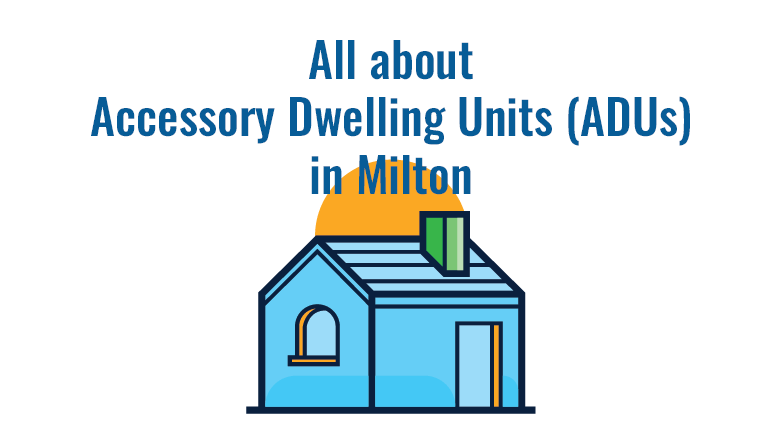All about Accessory Dwelling Units (ADUs) in Milton
Last week, Town Meeting experienced a spirited conversation about Accessory Dwelling Units (ADUs) in Milton. Ultimately, the article – a proposal to ease restrictions on accessory or in-law apartments- was referred back to the Planning Board for further study.
The following information was given to Town Meeting Members in an effort to assist with the understanding of ADUs, what they are, and what they mean for Milton.
ADUs are not new to Milton. Referred to as Temporary Apartments in the current bylaw, these units are either located within a single-family home or in a garage or barn. Strict limits are placed on the creation of Temporary Apartments, including a special permit process with the Board of Appeals.
The residents of Temporary Apartments within a home must be a family member, and the residents of the units located within a carriage house, garage or barn must be a family member or domestic employee.
There are 28 of these units under permit per the 2020 Housing Production Plan. But there are undoubtedly more without permits.
The renting of space to up to three lodgers, boarders or paying guests is allowed in the zoning bylaw without regulation.
The need for ADUs
- The population is aging, with 18% of Milton’s population over age 65.
- Most residents aged 65 and over want to stay in their community as they age, but most homes are not designed for aging in place.
- The housing stock is increasingly out of sync with these changing demographics.
- Household income has stagnated while median home prices and rents have exploded.
- Real estate taxes continue to rise, placing a burden on those on fixed incomes.
- Young adults cannot afford to return or stay in the town they grew up in.
(data source: Milton Housing Production Plan, 2020)
Benefits of ADUs
Great communities provide housing opportunities for people of all ages, incomes, and abilities, allowing everyone to live in a quality neighborhood regardless of their circumstances.
Provides homeowners with more options:
- Downsize while staying on their property and live in the ADU
- House a caretaker
- House their children or parents
- Gain an extra source of income by renting out the ADU
- Provides less-expensive housing choices
- Helps seniors stay in their community and “age in place”
- Provides options for low- and moderate-income residents
- Provides smaller housing option to meet the needs of empty nesters, smaller families, and young adults
- Makes it easier for people who work in Milton to live in Milton, such as teachers, firefighters, and nurses
Has a low impact on the environment and neighborhood
- Low development of open space
- No large, new construction projects
- Likely no new infrastructure needed
- Gentle density designed and maintained by homeowners
- More compact, infill development promotes more walkable, car-lite neighborhoods
Permitting
Units within an existing house are allowed as of right, while units within an addition or in a garage, carriage house or barn are required to receive a special permit from the Board of Appeals.
Neighbor Notice and Input
Under current zoning, any homeowner can build a house, an addition, a garage or other structures without notifying neighbors, unless a variance is needed. No notification of neighbors is required under this bylaw for those ADUs constructed as of right within an existing house.
This bylaw requires a special permit process, with notice to neighbors, for units requiring an addition and for those located in a garage, carriage house or barn.
Occupancy
The owner must live on the property, either in the main house or in the ADU, for a minimum of 6 months of each year. Either the ADU or the main house can be rented to a non-family member for lease periods of not less than 6 months.
Ownership
Ownership remains with the homeowner.
ADUs cannot be turned into condominiums for separate sale.
Unit Size
- Not more than 900 square feet, or half the size of primary house, whichever is smaller
- Not less than 500 square feet
- Not more than 2 bedrooms
Other Restrictions
- Short-term rentals are not allowed
- ADU is terminated on sale unless new owner signs an affidavit of owner-occupancy and files it with the Building Commissioner
- Design must keep the appearance of a single-family residence
- There is a 10-unit annual cap on the permitting of ADUs
Endorsements and Support
- Recommended in the Master Plan and Housing Production Plan.
- Endorsed by the Housing Committee, the Affordable Housing Trust and the Equity and Justice for All Committee.
ADU Zoning in the Region
- Chapter 358 of the Acts of 2020 – the Housing Choice Law – encourages adoption of ADU bylaws by reducing the quantum of vote from super majority to simple majority
- Average number of ADUs approved annually in greater Boston municipalities is 2.5 units (source: The State of Zoning for Accessory Dwelling Units, Pioneer Institute, 2018)
- Adopted by all Cape Cod towns in 2021
- About two-thirds of cities and towns in the Boston metro area (68 out of 101) allow ADUs, and more are working on zoning to allow them. Milton is one of the towns in the 68-figure count, through the existing temporary apartment provision in the zoning. (source: MAPC and Pioneer Institute)
What about you?
Can you see yourself – or a loved one – wanting or needing an ADU in order to remain in Town?
Leave your thoughts in the comments!







This ADU thing is being rammed down our throats. Nearby communities have studied and NOT implemented for very good reason. don’t be confused by the rhetoric. loved ones, partners dependents et al can stay with you. this proposal is about commercial apartments being allowed everywhere without concern for the impact on infrastructure.